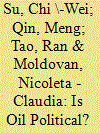| Srl | Item |
| 1 |
ID:
178628


|
|
|
|
|
| Summary/Abstract |
This paper investigates the political property of oil from the perspective of geopolitical risk (GPR). We explore the relationship between GPR and oil price (OP) by performing the full-sample and subsample rolling-window bootstrap Granger causality tests. We find that wars will lead to an increase in OP but that low GPR cannot lead to an immediate decline in price. This finding can also be explained by economic crises, which can make OP soar while GPR is low. In turn, the rise in OP has a positive impact on GPR. The oil market has a significant interaction with geopolitical events, which reflects the pattern of global politics, so we can conclude that oil has a political property. In the context of a tense and complex global relationship, the world can benefit from the political property of oil to prevent GPR, which can in turn facilitate an accurate prediction of OP to reduce the adverse effects of large fluctuations in the oil market.
|
|
|
|
|
|
|
|
|
|
|
|
|
|
|
|
| 2 |
ID:
133024


|
|
|
|
|
| Publication |
2014.
|
| Summary/Abstract |
Utilising a time-varying GAR (1)-TGARCH (1,1) model with different frequency data, we investigate the weak-form efficiency of major global crude oil spot markets in Europe, the US, the UAE and China for the period from December 2001 to August 2013. Our empirical results with weekly data indicate that all four markets have reached efficiency with few brief inefficient periods during the past decade, whereas the daily crude oil returns series suggest intermittent and inconsistent efficiency. We argue that the weekly Friday series fit the data better than the average series in autocorrelation tests. The evidence suggests that all four markets exhibit asymmetries in return-volatility reactions to different information shocks and that they react more strongly to bad news than to good news. The 2008 financial crisis has significantly affected the efficiency of oil markets. Furthermore, a comovement phenomenon and volatility spillover effects exist among the oil markets. Policy recommendations consistent with our empirical results are proposed, which address three issues: implementing prudential regulations, establishing an Asian pricing centre and improving transparency in crude oil spot markets.
|
|
|
|
|
|
|
|
|
|
|
|
|
|
|
|